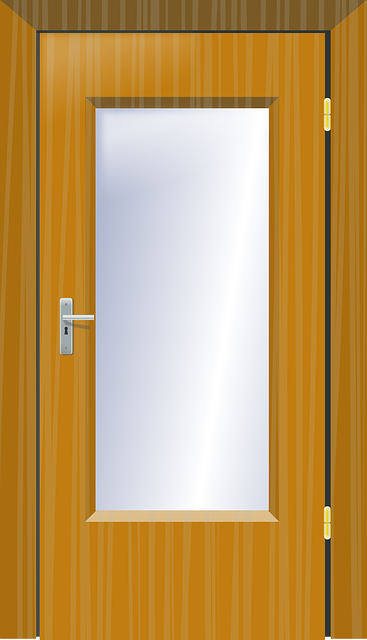Energy-efficient door replacements, such as those made from wood, steel, or fiberglass, significantly improve home insulation and curb energy bills by minimizing heat transfer and drafts. Key features include high R-values, weatherstripping, and low-e coatings. Wooden doors offer charm and durability, while steel doors provide strength and security. Fiberglass doors are lightweight, low maintenance, and highly insulative. When choosing an energy-efficient door replacement, prioritize insulation, durability, and aesthetic appeal to optimize comfort and curb appeal while reducing heating and cooling costs.
Choosing the right door materials is a significant decision that impacts both your home’s aesthetics and energy efficiency. This comprehensive guide offers expert insights on wood, steel, and fiberglass doors, highlighting their unique benefits and drawbacks. From traditional charm and modern insulation to strength, security, and lightweight champion, each material has its place. Understanding energy efficiency is crucial for an optimal home environment. Discover the factors to consider when deciding on an energy-efficient door replacement that aligns with your needs and preferences.
Understanding Energy Efficiency in Doors: A Key Factor for Your Home
When considering an energy-efficient door replacement, it’s crucial to understand how doors can significantly impact your home’s overall energy performance. Doors act as a vital barrier against external elements, but they also play a critical role in maintaining comfortable indoor temperatures and minimizing energy loss. In today’s digital era, modern door materials like wood, steel, and fiberglass offer advanced features designed to enhance energy efficiency.
One of the key factors to look for is the door’s R-value, which measures its ability to resist heat transfer. Higher R-values indicate better insulation and energy conservation. Additionally, weatherstripping and air seals are essential components that prevent drafts and keep external conditions at bay. Energy-efficient doors also incorporate low-emissivity (low-e) coatings, enhancing their insulating properties while allowing natural light to enter, thereby reducing the need for artificial lighting. Choosing an energy-efficient door replacement not only contributes to a more comfortable living environment but also offers long-term savings on your energy bills.
Wood Doors: Traditional Charm Meets Modern Insulation
Wood doors have long been a symbol of traditional charm and warmth in homes, but they also offer surprising modern benefits. With advancements in manufacturing techniques, wood doors are now designed to be more energy-efficient than ever before. They can provide excellent insulation, helping to regulate indoor temperatures and reduce energy bills. Moreover, modern treatments and coatings make wood doors durable and resistant to weather changes, ensuring they stand the test of time while enhancing a home’s aesthetic appeal.
When considering an energy-efficient door replacement, wood is a versatile option that combines functionality with style. Its natural beauty can complement various architectural designs, from classic to contemporary. With proper care and maintenance, wood doors can last for decades, making them a wise investment for any homeowner looking to improve their living space’s comfort and curb appeal simultaneously.
Steel Doors: Strength and Security for Ultimate Protection
Steel doors offer unparalleled strength and security, making them a popular choice for homeowners seeking robust protection. Known for their durability, these doors can withstand extreme weather conditions, from high winds to intense heat or cold, ensuring your home remains secure. They are also highly resistant to breaking, providing an extra layer of safety against potential intruders.
When considering an energy-efficient door replacement, steel doors excel in insulating properties, reducing heat transfer and maintaining comfortable indoor temperatures. Their solid construction creates a tight seal, minimizing drafts and improving overall energy efficiency. This feature not only saves on heating and cooling costs but also contributes to environmental sustainability.
Fiberglass Doors: The Lightweight Champion of Insulation
Fiberglass doors have emerged as a top choice for homeowners seeking both style and functionality, especially in terms of an energy-efficient door replacement. Their lightweight nature is a key advantage, enabling easier installation and reduced weight that can contribute to better insulation. This makes them an excellent insulator, helping to regulate indoor temperatures by minimizing heat transfer, which leads to significant energy savings over time.
Unlike wood or steel, fiberglass doesn’t expand or contract significantly with temperature changes, ensuring long-term stability and maintaining the door’s seal. Additionally, their durability is exceptional; they are resistant to rot, warping, and breaking, eliminating the need for frequent replacements. The smooth surface of fiberglass also makes them low-maintenance, requiring minimal cleaning and never needing paint or stain like wooden doors.
Making the Final Decision: Factors to Consider for Your Ideal Door Material
When making your final decision, consider factors that align with your unique needs and preferences for your home or business. Energy efficiency is a significant consideration when choosing door materials, especially if you’re opting for an energy-efficient door replacement. Steel and fiberglass doors, for instance, are renowned for their superior insulation properties, which can significantly reduce heating and cooling costs. Wood doors, while beautiful, may not offer the same level of insulation, but modern innovations have introduced core-filled wood options that provide better thermal resistance.
Another critical aspect to weigh is durability and low maintenance. Steel and fiberglass doors are known for their longevity and resistance to denting and breaking. Wood doors require more regular upkeep, including painting or staining, to maintain their aesthetic appeal. If you’re looking for a door that requires minimal care, steel or fiberglass might be the ideal choice. Additionally, consider factors like sound insulation, security, and visual aesthetics to ensure your chosen material complements your space and meets your specific requirements.
When choosing the perfect door for your home, considering both aesthetics and functionality is essential. Each material offers unique benefits, from wood’s classic appeal and excellent insulation to steel’s robust security and fiberglass’s impressive lightweight insulation. An energy-efficient door replacement isn’t just about looks; it’s a long-term investment in comfort and cost savings. By understanding the key factors and comparing options, you can make an informed decision that aligns with your home’s needs and your personal style.
